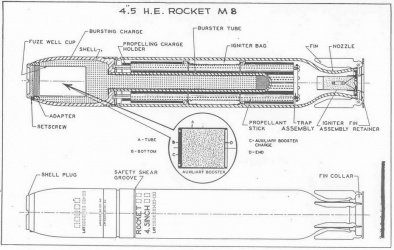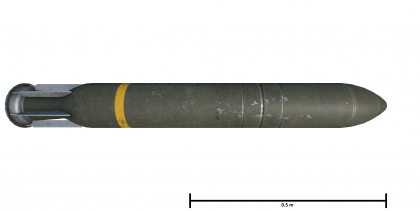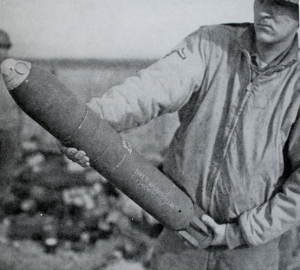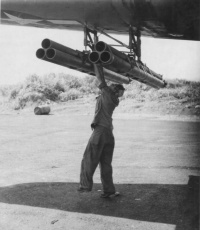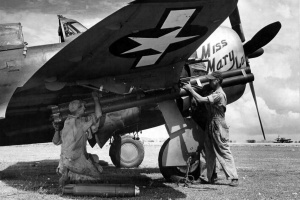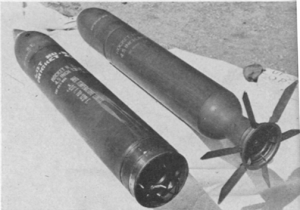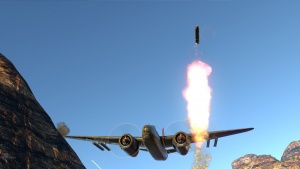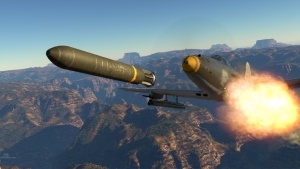Difference between revisions of "M8"
Inceptor57 (talk | contribs) m |
BravoTrooper (talk | contribs) (→Vehicles equipped with this weapon) (Tag: Visual edit) |
||
| Line 10: | Line 10: | ||
[[File:M8_rocket_sideview.jpg|520px|thumb|right|Side view of an '''{{PAGENAME}}''' 4.75 inch unguided rocket.]] | [[File:M8_rocket_sideview.jpg|520px|thumb|right|Side view of an '''{{PAGENAME}}''' 4.75 inch unguided rocket.]] | ||
{{break}} | {{break}} | ||
| − | The 4.5-inch (114 mm) '''{{PAGENAME}}''' fin- | + | The 4.5-inch (114 mm) '''{{PAGENAME}}''' fin-stabilized rocket is approximately 33 in (0.83 m) in length and 40 lb. (18.1 kg) and is almost an equivalent of a 105 mm Shell M1. This rocket utilizes an M4 fuse which explodes after a 0.015-sec delay set off by auxiliary M1 booster. |
| − | The components of the rocket break down into three separate sections, the fuse, shell and motor body. The shell of the rocket or the head is made up of a warhead body fitted with a burster tube. The burster tube itself extends from the shell through the rocket body and through the rocket motor, the purpose of this is to expand the explosive capability of the rocket by | + | The components of the rocket break down into three separate sections, the fuse, shell and motor body. The shell of the rocket or the head is made up of a warhead body fitted with a burster tube. The burster tube itself extends from the shell through the rocket body and through the rocket motor, the purpose of this is to expand the explosive capability of the rocket by utilizing the rocket motor as an additional source of fragmentation in the explosion. Once fired, folding fins around the tail flange will extend and spin-stabilize the rocket. |
The M8 rocket requires a tube launcher to launch (as opposed to being installed directly to external hardpoints) and this is accomplished by mounting an M10 cluster launcher to the underside of the aircraft's wings or fuselage belly. The M10 is a cluster of three 10-foot tubes manufactured from plastic (M14s are made from steel and M15s are constructed of magnesium alloy) and are banded together in six places and are secured to the aircraft via two mounting straps, front and rear. The rear strap also bears the electrical connections which link up to the rockets once in the tubes as the firing links. The release and contact mechanisms are protected from flying links and fired casings ejected from the wing guns to prevent accidental damage or drop release of the M10 launcher. | The M8 rocket requires a tube launcher to launch (as opposed to being installed directly to external hardpoints) and this is accomplished by mounting an M10 cluster launcher to the underside of the aircraft's wings or fuselage belly. The M10 is a cluster of three 10-foot tubes manufactured from plastic (M14s are made from steel and M15s are constructed of magnesium alloy) and are banded together in six places and are secured to the aircraft via two mounting straps, front and rear. The rear strap also bears the electrical connections which link up to the rockets once in the tubes as the firing links. The release and contact mechanisms are protected from flying links and fired casings ejected from the wing guns to prevent accidental damage or drop release of the M10 launcher. | ||
| Line 43: | Line 43: | ||
The M8 rocket is a 40 lb (18.1 kg) high explosive mass with a TNT warhead which travels at 600 mph (970 km/h). After slamming into a target a slight delay will set off the explosive mass of the missile causing the TNT shell to detonate along with fragmenting the rocket body and motor. Damage is caused by both the high explosives and fragmentation. | The M8 rocket is a 40 lb (18.1 kg) high explosive mass with a TNT warhead which travels at 600 mph (970 km/h). After slamming into a target a slight delay will set off the explosive mass of the missile causing the TNT shell to detonate along with fragmenting the rocket body and motor. Damage is caused by both the high explosives and fragmentation. | ||
| − | === Comparison with | + | === Comparison with analogs === |
''Give a comparative description of rockets that have firepower equal to this weapon.'' | ''Give a comparative description of rockets that have firepower equal to this weapon.'' | ||
| Line 54: | Line 54: | ||
'''Pros:''' | '''Pros:''' | ||
| + | |||
* Lightweight, able to mount on fighter aircraft | * Lightweight, able to mount on fighter aircraft | ||
* Can be used against bombers | * Can be used against bombers | ||
'''Cons:''' | '''Cons:''' | ||
| + | |||
* Inaccurate, best fired in groups to increase the chance of hitting a target | * Inaccurate, best fired in groups to increase the chance of hitting a target | ||
* Increases aerodynamic drag, decreasing flight efficiency | * Increases aerodynamic drag, decreasing flight efficiency | ||
| Line 76: | Line 78: | ||
== See also == | == See also == | ||
''Links to the articles on the War Thunder Wiki that you think will be useful for the reader, for example:'' | ''Links to the articles on the War Thunder Wiki that you think will be useful for the reader, for example:'' | ||
| + | |||
* ''reference to the article about the variant of the weapon;'' | * ''reference to the article about the variant of the weapon;'' | ||
* ''references to approximate analogues by other nations and research trees.'' | * ''references to approximate analogues by other nations and research trees.'' | ||
| Line 84: | Line 87: | ||
* ''encyclopedia page on the weapon;'' | * ''encyclopedia page on the weapon;'' | ||
* ''other literature.'' --> | * ''other literature.'' --> | ||
| + | |||
* [http://bulletpicker.com/pdf/USNBD%20-%20US%20Rockets%20and%20Fuzes.pdf US Rockets and Fuzes - United States Navy Bomb Disposal Manual, 15 May 1945, pg. 14] | * [http://bulletpicker.com/pdf/USNBD%20-%20US%20Rockets%20and%20Fuzes.pdf US Rockets and Fuzes - United States Navy Bomb Disposal Manual, 15 May 1945, pg. 14] | ||
* [https://sill-www.army.mil/firesbulletin/archives/1946/OCT_1946/OCT_1946_FULL_EDITION.pdf Hedekin, Thomas B., The Field Artillery Journal, October 1946, Volume 36, No. 10, page 568] | * [https://sill-www.army.mil/firesbulletin/archives/1946/OCT_1946/OCT_1946_FULL_EDITION.pdf Hedekin, Thomas B., The Field Artillery Journal, October 1946, Volume 36, No. 10, page 568] | ||
Revision as of 19:34, 5 August 2021
| This page is about the American-made rocket M8. For other uses, see M8 (Disambiguation). |
Contents
Description
The 4.5-inch (114 mm) M8 fin-stabilized rocket is approximately 33 in (0.83 m) in length and 40 lb. (18.1 kg) and is almost an equivalent of a 105 mm Shell M1. This rocket utilizes an M4 fuse which explodes after a 0.015-sec delay set off by auxiliary M1 booster.
The components of the rocket break down into three separate sections, the fuse, shell and motor body. The shell of the rocket or the head is made up of a warhead body fitted with a burster tube. The burster tube itself extends from the shell through the rocket body and through the rocket motor, the purpose of this is to expand the explosive capability of the rocket by utilizing the rocket motor as an additional source of fragmentation in the explosion. Once fired, folding fins around the tail flange will extend and spin-stabilize the rocket.
The M8 rocket requires a tube launcher to launch (as opposed to being installed directly to external hardpoints) and this is accomplished by mounting an M10 cluster launcher to the underside of the aircraft's wings or fuselage belly. The M10 is a cluster of three 10-foot tubes manufactured from plastic (M14s are made from steel and M15s are constructed of magnesium alloy) and are banded together in six places and are secured to the aircraft via two mounting straps, front and rear. The rear strap also bears the electrical connections which link up to the rockets once in the tubes as the firing links. The release and contact mechanisms are protected from flying links and fired casings ejected from the wing guns to prevent accidental damage or drop release of the M10 launcher.
Vehicles equipped with this weapon
| Vehicles equipped with this weapon | |
|---|---|
| Fighters | |
| P-39 | P-39N-0 · P-39Q-5 |
| P-47 | P-47D-22-RE · ▄Thunderbolt Mk.1 · P-47D-28 |
| P-51D | P-51D-5 · P-51D-10 · ␗P-51D-20 · P-51D-20-NA · P-51D-30 · P-51H-5-NA · ␗P-51K |
| Twin-engine fighters | P-38G-1 · XP-38G · P-38J-15 · Bong's P-38J-15 |
| Attackers | A-20G-25 |
| Medium tanks | Calliope · M26 T99 |
| Motor torpedo boats | PT-200 |
General info
Tell us about the tactical and technical characteristics of the rocket.
Effective damage
The M8 rocket is a 40 lb (18.1 kg) high explosive mass with a TNT warhead which travels at 600 mph (970 km/h). After slamming into a target a slight delay will set off the explosive mass of the missile causing the TNT shell to detonate along with fragmenting the rocket body and motor. Damage is caused by both the high explosives and fragmentation.
Comparison with analogs
Give a comparative description of rockets that have firepower equal to this weapon.
Usage in battles
The M8 rockets are typically mounted on an aircraft in groups of three (usually two launchers of three) or a total of 16 on the boat Higgins 78 ft PT-200. The M8 rocket is typically best utilised against personnel, installations and light armoured vehicles due to the fantastic fragmentation of this rocket upon impact and explosion.
Pros and cons
Pros:
- Lightweight, able to mount on fighter aircraft
- Can be used against bombers
Cons:
- Inaccurate, best fired in groups to increase the chance of hitting a target
- Increases aerodynamic drag, decreasing flight efficiency
History
Describe the history of the creation and combat usage of the weapon in more detail than in the introduction. If the historical reference turns out to be too long, take it to a separate article, taking a link to the article about the weapon and adding a block "/History" (example: https://wiki.warthunder.com/(Weapon-name)/History) and add a link to it here using the main template. Be sure to reference text and sources by using <ref></ref>, as well as adding them at the end of the article with <references />.
Media
See also
Links to the articles on the War Thunder Wiki that you think will be useful for the reader, for example:
- reference to the article about the variant of the weapon;
- references to approximate analogues by other nations and research trees.
External links
- US Rockets and Fuzes - United States Navy Bomb Disposal Manual, 15 May 1945, pg. 14
- Hedekin, Thomas B., The Field Artillery Journal, October 1946, Volume 36, No. 10, page 568
- OS-9-69 Rockets and Launchers, All Types, The Ordnance School - Aberdeen Proving Ground, Maryland, February 1944, pages 65, 67 and 68.
- War Thunder Forum Bug Report: M8 Rocket Performance Error
- Wikipedia - M8 (rocket)
| Naval special armaments | |
|---|---|
| USA | |
| Mortars | 7.2-inch T37 · Mk 2 |
| Rockets | 5-inch GPSR Mk.7 · Mark 108 Weapon alfa |
| Missiles | RIM-24A |
| Germany | |
| Rockets | M/50 Bofors |
| Missiles | Strela-2M |
| USSR | |
| Mortars | BM-37 · RBM · RBU-1200 · RBU-2500 · RBU-6000 · RKU-36U |
| Rockets | BM-14-17 · BM-21 · M13 · M-8 |
| Missiles | Volna-M |
| Britain | |
| Mortars | Ordnance ML 4.2-inch mortar |
| Japan | |
| Rockets | 4.5-inch BBR Mk.7 (USA) · Mark 108 Weapon alfa (USA) |
| Italy | |
| Missiles | Nettuno |
| France | |
| Missiles | SS.11 |


